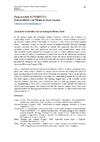Please use this identifier to cite or link to this item:
https://accedacris.ulpgc.es/jspui/handle/10553/69399
| DC Field | Value | Language |
|---|---|---|
| dc.contributor.author | Álvarez Gil, Francisco José | en_US |
| dc.date.accessioned | 2020-01-27T14:39:48Z | - |
| dc.date.available | 2020-01-27T14:39:48Z | - |
| dc.date.issued | 2018 | en_US |
| dc.identifier.uri | https://accedacris.ulpgc.es/handle/10553/69399 | - |
| dc.description.abstract | In the present paper the evidential adverbs certainly, evidently and obviously as stancetaking devices are analysed. For this, I have selected a corpus of history texts from the Modern English period (1700-1900), as compiled in The Corpus of History English Texts, a subcorpus within the Coruña Corpus of English Scientific Writing. Although manual inspection has been employed to analyse the pragmatic functions of these evidential adverbs, they have previously examined using computerised corpus tools. The adverbial devices explored in this paper are said to express authorial stance and to communicate the author’s commitment or detachment towards the information presented, and so they are classified as epistemic adverbs. I have decided to choose adverbials as the target linguistic devices of my analysis because they are usually considered as one of the grammatical categories that most clearly contribute to the expression of interpersonal meanings (Biber and Finegan 1988). From a diachronic perspective even if much research is still to be done in academic texts, there exist some relevant studies on stance devices carried out within the arena of historical pragmatics (cf. Gray et al. 2011). Following this tradition, I focus on the adverbs certainly, evidently and obviously as examples of a stancetaking feature to evaluate how this form signals authorial position. The findings suggest that, in the scientific articles from the historical discipline, those adverbs are used with differing pragmatic functions, e.g. strengthening a claim. In my assessment of instances, I also consider the context in which these forms appear. This means especially the syntactic context, since it has some important effects on the pragmatics of these and other adverbs, as I have shown elsewhere (Álvarez-Gil 2017). | en_US |
| dc.language | eng | en_US |
| dc.source | International Conference on Evidentiality and Modality ICEM’18. Madrid 19-22 septiembre. Department of English Studies. Facultad de Filología. Universidad Complutense de Madrid, p. 11-12 | en_US |
| dc.subject | 57 Lingüística | en_US |
| dc.title | An analysis of adverbial devices in English History Texts | en_US |
| dc.type | info:eu-repo/semantics/conferenceObject | en_US |
| dc.type | ConferenceObject | en_US |
| dc.investigacion | Artes y Humanidades | en_US |
| dc.type2 | Actas de congresos | en_US |
| dc.utils.revision | Sí | en_US |
| dc.identifier.ulpgc | Sí | es |
| item.grantfulltext | open | - |
| item.fulltext | Con texto completo | - |
| crisitem.author.dept | GIR Discourse, Communication and Society | - |
| crisitem.author.dept | Departamento de Filología Moderna, Traducción e Interpretación | - |
| crisitem.author.orcid | 0000-0002-8752-9091 | - |
| crisitem.author.parentorg | Departamento de Filología Moderna, Traducción e Interpretación | - |
| crisitem.author.fullName | Álvarez Gil, Francisco José | - |
| Appears in Collections: | Actas de congresos | |
Page view(s)
82
checked on Jan 10, 2026
Download(s)
45
checked on Jan 10, 2026
Google ScholarTM
Check
Share
Export metadata
Items in accedaCRIS are protected by copyright, with all rights reserved, unless otherwise indicated.
